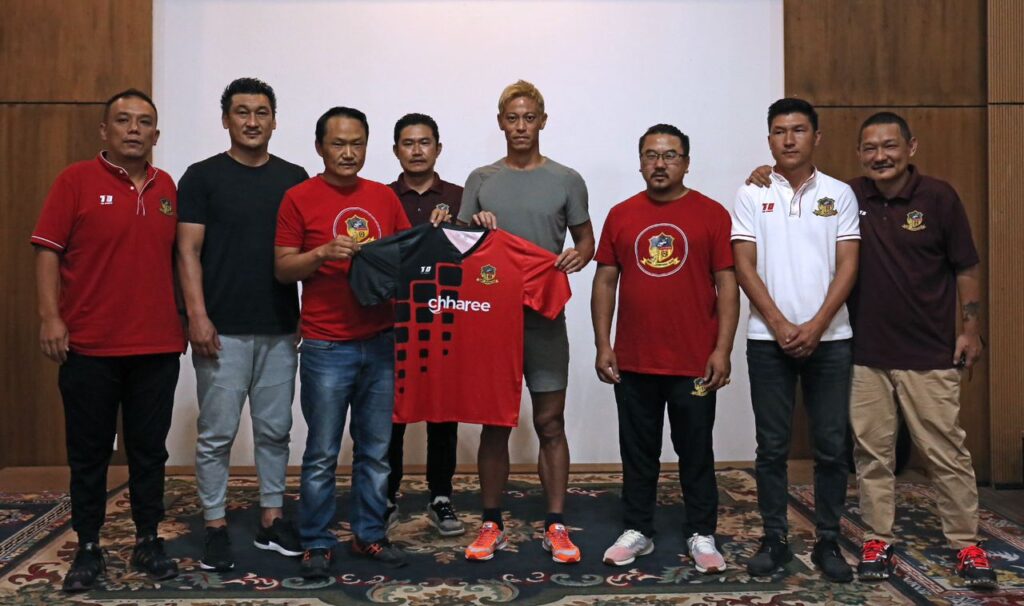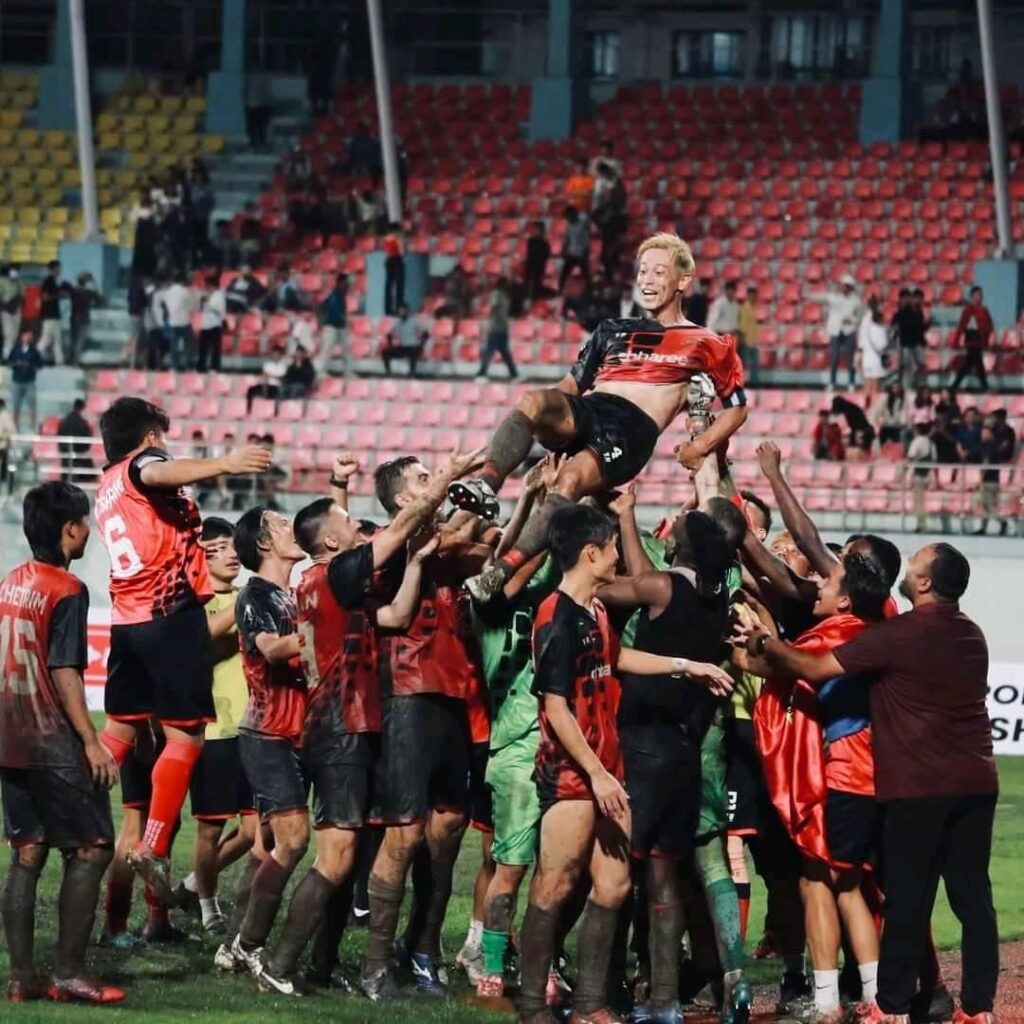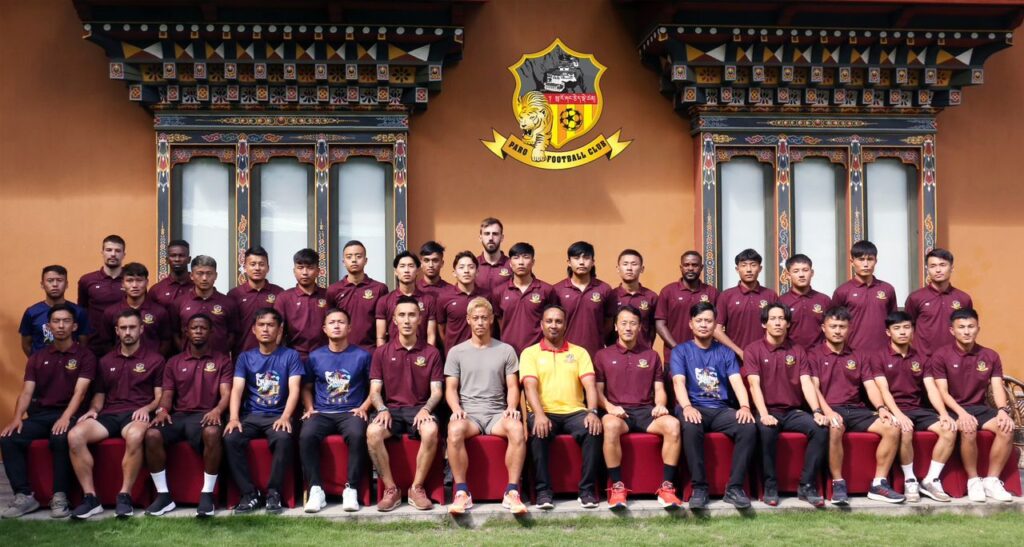
In the AFC Challenge League Group A fixtures in Thimphu, Bhutan, the local side, Paro FC, garnered much attention on the media and Internet with their star signing, Keisuke Honda. Honda, one of the biggest names in the history of Asian football – a former AC Milan and CSKA Moscow star – who represented the Japanese national team 98 times at the senior level, was a name nobody would have associated with a club in the Bhutan Premier League.
Reportedly, Honda signed for Paro on a one-match deal – the AFC Challenge League qualifier against Church Boys FC of Nepal. However, he was seen playing a few league games and was on the scoresheet as well. There wasn’t much information on the Internet regarding this transfer, and the question of how a football God landed in Bhutan, a low-ranked country in world football, remained unanswered. In an attempt to know more about this unique deal, RevSportz reached out to Karma Jigme, president of Paro FC. Here’s how the conversation went.
How did Paro FC connect with Keisuke Honda?
Jigme: We reached out to Keisuke Honda through our Japanese agent, who knows Honda. We were in search of a high-calibre, left-footed player. Honda, already actively involved in projects to promote football’s growth in different countries, found Paro FC’s vision highly appealing. Paro FC’s commitment to advancing Bhutanese football and creating more opportunities for local players resonated with Honda’s own mission to elevate football in developing regions, cementing a strong connection between both parties.

There was speculation that Honda’s club in Cambodia had some players who are currently part of Paro, and that might have influenced the move. Thoughts?
Honda, now 37, previously managed the Cambodian national side and also owned a club in Cambodia called Soltilo Angkor, in Siem Reap, that played in the Cambodian 2nd division. The club was discontinued due to lack of sponsorship.
Jigme: Yes, we do have one such player – Tomo (Tomoyuki Unno). It might have helped him (Honda) know more about Paro FC.
What was the project that attracted Honda to come to Bhutan, and especially Paro FC?
Jigme: The project that drew Honda to Bhutan was Paro FC’s goal of raising the standard of Bhutanese football, with a particular focus on the AFC Challenge League. By bringing Honda on board, Paro FC hoped to inspire local players, increase competitive intensity, and enhance fan engagement. Honda’s presence also attracted international attention, helping to highlight the potential of Bhutanese football on a larger stage.
The ‘One-Match-Deal’ has been doing the rounds on the Internet with not much clarification. Could you please throw some light on this?
Jigme: The one-match contract frequently mentioned in reports refers to Honda’s short-term arrangement to support Paro FC for the AFC Challenge League. While initially a limited engagement, the terms were flexible, allowing Honda to play in multiple matches as his schedule allowed. This arrangement enabled him to participate in the BoB Bhutan Premier League while contributing to Paro FC’s broader project, enhancing the team’s performance and providing local players with a unique learning opportunity.

Could you give us an idea of the financial terms involved in this deal – with the obvious question being Honda’s stature in world football?
Jigme: While financial details remain undisclosed, Honda’s remuneration reflected a balanced agreement aligned with his contribution and Paro FC’s financial constraints. His involvement seemed motivated by a commitment to supporting football development rather than financial gain, fitting well with Paro FC’s limited budget for foreign players.
Any future projects with Honda?
Jigme: Paro FC is open to future collaborations with Honda, considering his strong interest in football development. Potential future projects could involve coaching, training, or youth development programs. Paro FC envisions initiatives where Honda’s expertise could make a long-lasting impact on Bhutan’s football ecosystem.
What would be a normal budget for a club contending for the title?
Jigme: For Bhutanese clubs aiming to contend for the league title, a typical seasonal budget ranges between $100,000 and $250,000. This budget covers player salaries, fees for foreign players, training facilities, travel, and match-day expenses. Financial capacities vary among clubs, but top-tier teams often allocate slightly higher budgets to bring in experienced foreign talent.
Are the players in the league professionals?
Jigme: Not all players in the Bhutan League are full-time professionals. Some players balance football with other jobs or academic pursuits, particularly at clubs with smaller budgets. However, players on title-contending teams, especially those with foreign professionals, are more likely to be in full-time or semi-professional roles. Although the league is moving towards increased professionalism, many Bhutanese players still pursue diverse career paths alongside football.




